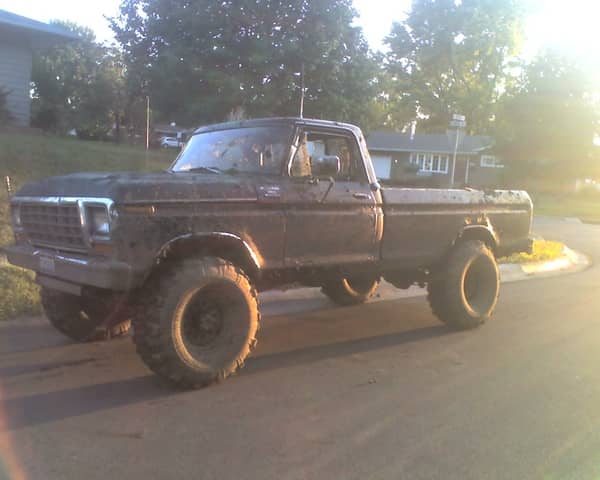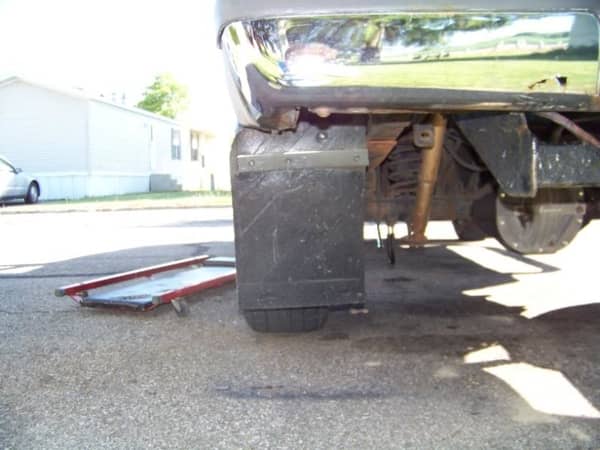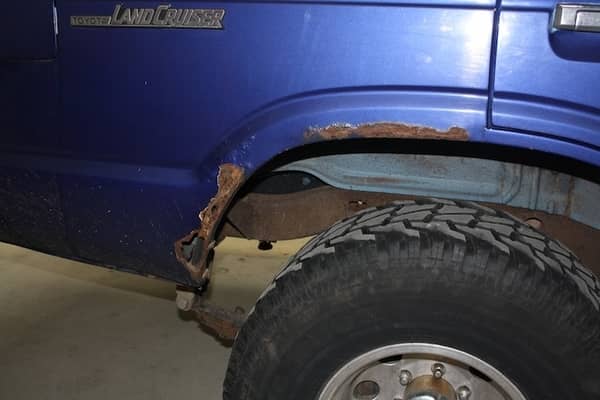Mud flaps are an essential tool for keeping debris from the road from ricocheting off your truck’s spinning tires and onto your truck or nearby vehicles. In doing so, they offer valuable protection for both you and your truck, as well as for those on the road around you. However, as worthwhile an investment as mud flaps can be, they have one major flaw.
Do mud flaps cause rust? Mud flaps, specifically where they attach to a vehicle’s fenders, can potentially accumulate dirt, water, and other debris in the divots. When this occurs, a truck’s undercarriage can become greatly corroded due to rusting.
Despite this drawback, mud flaps are still a great investment for keeping your truck clean and preventing corrosion along the undercarriage; especially if you travel on roads with loose debris or gravel and live in an area with inclement weather. Also, keep in mind that not all mud flaps are created equal, so read on to find out which features to look for to minimize future rust.
How Do Mud Flaps Protect You and Your Truck?
Mud flaps, also known as splash guards or mud guards, are protective pieces of fairly flexible material that hang from your truck’s wheel well. Their main purpose is to act as a barrier between the wheel well and the tire rotating inside of it.

As you drive over the road, debris, such as gravel, mud, or litter, can be kicked up by your rotating tires. Mud flaps, along with your vehicle’s fender, block this debris from hitting the underside of your truck or other vehicles or pedestrians. Over time, this provides valuable protection for your truck because it prevents or slows down potential corrosion.
Generally, mud flaps are rectangular sections of material, and they can be made from plastic, rubber, carbon fiber, or even metal. Depending on the model you purchase, they can either be flat or molded for aerodynamics and additional splash/spray reduction. Additionally, you can purchase models that can be mounted with or without drilling into the wheel well.
Do Mud Flaps Keep Trucks Cleaner?
When vehicles without mud flaps drive over loose debris, the rotation of the tires can send debris flying into the underside and across the side panels of your vehicle, creating a mess every time you drive on unpaved roads.
In contrast, when a vehicle has mud flaps, these flexible barriers absorb the impact and block the trajectory of kicked up debris, minimizing their spread onto and away from the vehicle. Not only does this keep your vehicle cleaner, but it also provides protection for people standing or driving near your truck, which makes roadways safer for everyone.
Although mud flaps have grown in popularity among car drivers, they are typically used on trucks and SUVs. That is because their protective attributes are even more valuable in vehicles with deeper wheel wells, bigger tires, and deeper tire treads. This combination of factors results in larger debris sprays, which makes mud flaps even handier to have installed.
Moreover, trucks and SUVs are often used for off-roading, which carries the associated risks of driving on unpaved and potentially muddy paths. As a result, many truck and SUV drivers will get considerable value out of installing mud flaps, which typically run around $50 for reliable models, including products from aftermarket brands like:
- Rally Armor
- Weather Tech
- Road Sport
- Highland
Should You Use Mud Flaps on Your Truck?
If you live and drive in an area with frequent rain and show, drive on gravel/dirt roads, and have a vehicle with deep fender wells, having mud flaps will protect both the underside of your truck and its paint job.
The return on investment of buying and installing mud flaps comes fairly quickly, since mud flaps can help you avoid the corrosion and destruction of expensive auto parts on the underside of your truck and keep sharp debris, like gravel, rocks, and glass, from hitting and chipping your paint.

Apart from reducing the future repair frequency and costs for your vehicle, mud flaps can also save you money by increasing how long you can go between car washes. Although some truck drivers complain that mud flaps add drag and slow you down on the road, nowadays there are many aerodynamically designed models that reduce the dragging effect.
Overall, mud flaps are an excellent and cost-effective way to not only keep your undercarriage in good condition but to also protect your paint job and reduce your expenses for vehicle upkeep.
How Do Mud Flaps Cause Rust?
In somewhat of a contradiction of their intended purpose, mud flaps themselves can result in rusting. Mud flaps help prevent mud and water from splashing the undercarriage of a truck or SUV, which reduces the amount of moisture that can reach and accumulate in hard-to-clean parts and recesses.
However, mud flaps themselves take quite a beating from repeated splashing and spraying of debris. As a result, any connections to the fender with open cavities or crevices are an opportunity for dirt and moisture to collect.

So, while mud flaps themselves don’t cause rust, they can be susceptible to it based on the design and placement of their attachment points. If you purchase and install mud flaps that require drilling into the wheel well, this can create additional opportunity for future rust to your vehicle frame, especially if not all of the fittings are attached tightly and securely enough to prevent moisture build-up.
Are Certain Types of Mud Flaps More Likely to Cause Rust?
As previously mentioned, some mud flaps require drilling, however that’s not the case will all models, especially if you purchase one that’s produced by the Original Equipment Manufacturer (OEM) of your vehicle (i.e. Ford, RAM, Jeep, etc.).
OEM mud flaps are more likely to have proper fitting and placement on your wheel well, which will reduce the potential for moisture to accumulate in the wheel wells and behind the mud flap within the wheel well wall itself.
Often times, it may be tempting to go with a universal, aftermarket model of mud flaps for your vehicle, especially as the price can be considerably cheaper. However, if you’re concerned about the potential for future rusting, always go with an OEM model, if its available. Also, custom aftermarket mud guards will prevent unnecessary damage from occurring.
Choosing the Right Material for Mud Guards
Additionally, make sure to carefully weigh your options when it comes to what your mud flaps are made out of. Mud flaps can come in the following materials:
- Rubber
- Plastic
- Silicon
- Metal
- Carbon fiber
Out of these options, you’ll most likely want to go with rubber or plastic mud flaps. While carbon fiber mud flaps could arguably be labeled as the best option, they tend to be priced quite high. This undermines the value for your money that you would otherwise get from these parts.
Given that you will need to replace your mud flaps in years to come, it’s advisable to go with more affordable yet still effective options. Between rubber and plastic mud flaps, those made from rubber are often much more heavy duty in construction. However, they can degrade quickly if used frequently on rough terrain, so they may need to be replaced more often if you often go off-roading.
Plastic mud flaps are generally used for smaller cars, like sedans, but there are still some brands out there that make more heavy-duty options that offer longevity on top of the flexibility that rubber mud flaps offer. In contrast, metal mud flaps are quite relatively rigid, which makes them more suitable for deflecting mud rather than solid debris.
Silicon mud flaps are best avoided to reduce the risk of rust. Silicon is slightly acidic, which can create an environment within your wheel well that makes rusting occur more quickly.
If you’re thinking of different ways to accessorize your truck or make it more functional, consider checking out my recommended accessories page. I spent a good amount of time picking out mods that can be useful for most pickup trucks.

